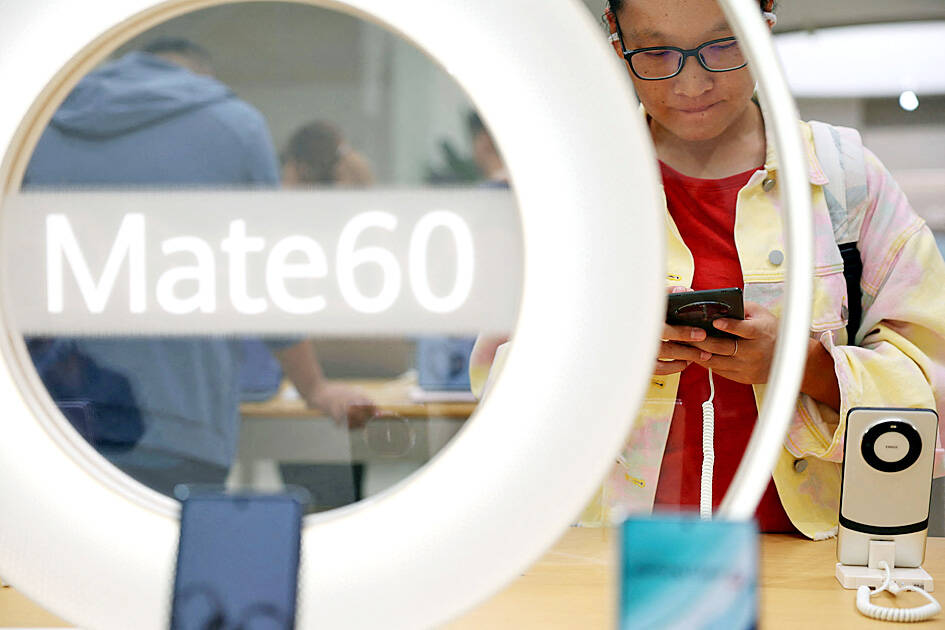Huawei Technologies Co (華為) largely omitted mention of its controversial Mate 60 smartphone series at a grand showcase of its new consumer products yesterday.
The Shenzhen-based company would increase smartphone production in response to demand, said consumer division chief Richard Yu (余承東), without naming the handset triggering that surge.
The Mate 60 Pro earned international notoriety with its advanced made-in-China processor last month, causing concern in Washington about Huawei’s progress toward developing in-house chipmaking capabilities despite US trade curbs.

Photo: Reuters
Huawei’s new phones have fired up the company’s sales and were among the top sellers in China in the week before Apple Inc’s latest iPhone launch. They are the first 5G-capable handsets that Huawei has put on sale since the administration of former US president Donald Trump’s sanctions cut it off from advanced tech suppliers. That connectivity is provided by the 7-nanometer Kirin 9000s processor inside — made by Shanghai-based Semiconductor Manufacturing International Corp (中芯) — which is accompanied by a broad range of China-made components inside each phone.
In another step toward self-reliance, Huawei did away with its longstanding partnership with Porsche Design, appointing instead Hong Kong celebrity Andy Lau (劉德華) as a brand ambassador to promote what it now calls Ultimate Design models.
Huawei provided a seconds-long glimpse of such a limited-edition variant of its Mate 60, and showed off its flagship MatePad tablet and new smartwatches.
Yu spent much of his time on stage benchmarking the MatePad Pro against Apple’s iPad Pro, underscoring Huawei’s aspiration to measure itself against the world’s best.
The Chinese company also touted its own semiconductor design used in a new set of wireless earbuds, though it did not provide details on the chip.
Meanwhile, Apple’s basic iPhone 15 model is taking almost twice as long for deliveries this year than its predecessor, signaling high demand for the company’s latest handsets.
US buyers need to wait for 10 days to receive the basic model, up from six days for the previous generation device launched last year, Counterpoint Research data showed.
At the other end of the spectrum, Apple’s top-tier iPhone 15 Pro Max increased pre-order waiting times to a record, researchers found.
In China, Apple’s largest overseas market, wait times for the basic version quadrupled from last year, Counterpoint said.
That suggests Apple is attracting buyers even amid competition from rival devices such as Huawei’s highly touted Mate 60 Pro.

With an approval rating of just two percent, Peruvian President Dina Boluarte might be the world’s most unpopular leader, according to pollsters. Protests greeted her rise to power 29 months ago, and have marked her entire term — joined by assorted scandals, investigations, controversies and a surge in gang violence. The 63-year-old is the target of a dozen probes, including for her alleged failure to declare gifts of luxury jewels and watches, a scandal inevitably dubbed “Rolexgate.” She is also under the microscope for a two-week undeclared absence for nose surgery — which she insists was medical, not cosmetic — and is

CAUTIOUS RECOVERY: While the manufacturing sector returned to growth amid the US-China trade truce, firms remain wary as uncertainty clouds the outlook, the CIER said The local manufacturing sector returned to expansion last month, as the official purchasing managers’ index (PMI) rose 2.1 points to 51.0, driven by a temporary easing in US-China trade tensions, the Chung-Hua Institution for Economic Research (CIER, 中華經濟研究院) said yesterday. The PMI gauges the health of the manufacturing industry, with readings above 50 indicating expansion and those below 50 signaling contraction. “Firms are not as pessimistic as they were in April, but they remain far from optimistic,” CIER president Lien Hsien-ming (連賢明) said at a news conference. The full impact of US tariff decisions is unlikely to become clear until later this month

GROWING CONCERN: Some senior Trump administration officials opposed the UAE expansion over fears that another TSMC project could jeopardize its US investment Taiwan Semiconductor Manufacturing Co (TSMC, 台積電) is evaluating building an advanced production facility in the United Arab Emirates (UAE) and has discussed the possibility with officials in US President Donald Trump’s administration, people familiar with the matter said, in a potentially major bet on the Middle East that would only come to fruition with Washington’s approval. The company has had multiple meetings in the past few months with US Special Envoy to the Middle East Steve Witkoff and officials from MGX, an influential investment vehicle overseen by the UAE president’s brother, the people said. The conversations are a continuation of talks that

CHIP DUTIES: TSMC said it voiced its concerns to Washington about tariffs, telling the US commerce department that it wants ‘fair treatment’ to protect its competitiveness Taiwan Semiconductor Manufacturing Co (TSMC, 台積電) yesterday reiterated robust business prospects for this year as strong artificial intelligence (AI) chip demand from Nvidia Corp and other customers would absorb the impacts of US tariffs. “The impact of tariffs would be indirect, as the custom tax is the importers’ responsibility, not the exporters,” TSMC chairman and chief executive officer C.C. Wei (魏哲家) said at the chipmaker’s annual shareholders’ meeting in Hsinchu City. TSMC’s business could be affected if people become reluctant to buy electronics due to inflated prices, Wei said. In addition, the chipmaker has voiced its concern to the US Department of Commerce